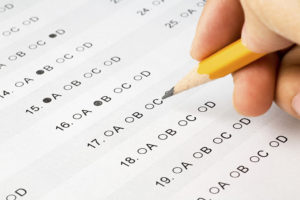The Dirty Truth Behind Standardized Testing
A new editorial has been written responding to this Op-Ed: “Standardized testing is “dirty” but it’s not the dirtiest“
“Aw man… But I need to prepare for the SAT tomorrow.” As a high-school student myself, I’ve heard numerous students decline invitations to hang out or to watch a volleyball game with that statement. Such a student heads home immediately after school, pushing off any extracurricular activities. He sits at his desk and takes a deep breath, dreading the long night ahead of him. He assures himself that he will not be distracted by placing his smartphone face down. Taking out a bulky book from the cabinet, he flips open the labyrinthine text. As the clock ticks, his back slowly slouches into an arc, causing stress on his spine. Rubbing his eyes, he carries on nonetheless to face the enemy ahead of him. And when the sun peaks out its cheerful rays, he wakes up with his face flat on the book titled “The Complete Guide to the SAT.” Dark shadows can be seen under his eyes. Accompanying this, there are also light imprints on his face. But he takes no notice. Checking the clock, he rushes out of the house.
Most students live out the above scene several times throughout their academic career as they prepare for standardized tests. They place these exams as their top priorities and delay activities interfering with their studying. But, why do they worry so much about such tests? In modern times, standardized testing has emerged as the new benchmark of a student’s academic pedigree. An overwhelming percentage of universities currently require their applicants to register with a standardized test score. However, John Katzman, the president and founder of the Princeton Review, boldly stated that, “The SAT is a scam”. Some critics agree, explaining how these exams are in fact biased towards certain groups of people. Others also assert that the scores of standardized tests are inaccurate in determining the intelligence of a student due to potential grading errors. Many experts and articles criticize the SAT and the ACT, two major standardized tests, for being futile in ascertaining a student’s academic potential; instead, they measure only a student’s ability to take a test. All in all, standardized testing is detrimental towards students and should be avoided.
Standardized exams are biased in that they favor certain groups of people over others. According to statistics provided by The Washington Post, students from families with a household income of more than $200,000 per year score 388 points higher on the SAT than students from families earning less than $20,000 per year. In other words, wealthier students tend to score significantly higher than other students. This notable gap brings up concern of whether the standardized testing benefits primarily wealthy students as they can afford more prestigious test prep classes and books. As Katzman pointed out about the SAT in an interview, “There’s a certain idiom to the test. There’s a certain way they ask questions. There’s a certain way to create wrong answers. And if you’re good at that idiom, then you’re going to do well on testing in general.” Essentially, standardized testing has a certain pattern to it and prep classes teach their students about such loopholes. Students with higher financial capabilities can therefore afford more classes as such. After eventually being bombarded with innumerable standardized questions, any student can perform well on such exams, if only they take an extensive amount of appropriate courses. However, what about poorer students? What about the students who cannot afford such superficial yet beneficial prep classes? Without the necessary funds, these students have an unfair disadvantage compared to wealthier students. Some of these economically challenged students may be just as intelligent as their wealthier counterparts, and some may be even brighter. But, because of their inability to attend prep classes to fully comprehend the patterns behind these standardized tests, they receive a lower score.
Shouldn’t standardized testing grant students – rich or poor alike – the same privileges? It definitely should. As exemplified by the scoring gap between the wealthier students and poorer students, these exams deny an equal chance for students to demonstrate their intellectual capabilities. They are basically starting from different points in a race. In a sports event, such unfair contests would be considered a hoax. The results would always be tainted as the advantaged racers would always claim victory. The competition itself would be frowned upon. How are the SATs any different? Standardized tests, in a similar manner, are consequently unjust because they favor certain groups of people over others.
In addition, the story of a close friend’s experiences with the SAT surprised me about the test’s ability to truly determine a student’s intelligence. My friend consistently achieves high grades in his academics. His report card can only be described as flawless. Often, after report cards are distributed, everyone gawks over my friend’s letter grades and claims wildly that he is superhuman. As I take a quick peek at this seemingly holy piece of paper, all I can stare at is the never-ending list of A’s and A+’s. He is one of the brightest people I know. However, that was not the case when he received the results of the recent SAT he took. I can still remember the moment when he grudgingly told me his score because it came to me as a profound shock. It was so surprising because I know how intelligent my friend is and how much he prepared for the test; yet the score he received was miles away from his deserved result. Even his PSAT scores demonstrated a high academic potential. Yet, to colleges, this test score will represent his overall academic abilities. One score, accurate or not, will label his intelligence. Standardized testing, as illustrated, fails to assess a student’s true academic ability.
My friend was greatly shaken by that test result and expressed his despair to me. I could do nothing but assure him that people with true talents will earn their rewards eventually. However, my confidence was shaken as a result. I started to question the advice I gave to my friend. I wondered if the golden truth of people deserving what they receive was in fact accurate. And it prompted me to dig up some statistics about standardized testing. After further research, that “truth” slowly crumbled up in my head.

One reality about standardized tests is that grading errors are possible. An article from The New York Times depicts how “about 4,000 students who took the SAT…received test scores that were lower than they should have been — some by as much as 100 points — because of technical problems in the scoring process” in 2006. The article continues to explain how these errors were only discovered and announced by College Board, the non-profit company behind the SAT, during the height of college admissions. Colleges, such as the University of Oregon, New York Institute of Technology, and others, had already decided to accept or reject applicants at that time. Such events prove that errors in grading the standardized tests while scanning the tests are possible. The way a test-taker shades in his or her answers can cause the machine to grade it incorrectly. Systematic errors caused by the testing companies themselves can impact students’ scores negatively. Most importantly, errors made by standardized tests can seriously harm a student’s chances of acceptance to a desired college. This supports the fact that these so-called “fair” exams are actually incapable of truly demonstrating a student’s academic potential.
My friend, after receiving such an unsatisfying score, also declared that the testing company of the SAT, College Board, had made a mistake with his scoring at one point. And it may well have been the case. Unfortunately, he simply does not know how the College Board graded his paper. With such a lack of information about his test, he cannot decide whether he should communicate with the College Board or just sign up for another test. Essentially, standardized testing is unfair at labeling a student’s achievement because of potential errors made by testing companies themselves.
However, some advocates of standardized testing urge that such exams may be the only solution right now to determine the academic performance of a student. But aren’t there other viable alternatives? A portfolio consisting of the student’s academic life, extracurricular activities, and others could be created along his or her learning years as a reference for the accomplishments of a student. These types of assessments are comparatively better than standardized tests as they provide much more than just a mere test score. They supply colleges with accurate data of what the student can do and impart insights into the personality of the student. A number on a test cannot accurately assess all of those areas. Therefore, although standardized testing may currently seem like the only fair standard, there are other, possibly better, solutions.
In summary, standardized testing is damaging to both students and colleges as they are unjust in determining a student’s intelligence. These exams are not only biased towards certain kinds of test-takers, but also because they potentially provide error-ridden test scores which misrepresent a student’s academic capabilities. It is evident that standardized testing is not the means of determining the next Bill Gates or Steve Jobs. In fact, universities and colleges should not select their students solely based on how well they take a test. They should instead view the student as a whole package and get to know the student as a person.
Featured Image Student stressing over standardized tests courtesy of CollegeDegrees360 via Flickr
Continue on to the editorial “Standardized testing is “dirty” but it’s not the dirtiest” written by Wesley Ding in response to this Op-Ed


Jason, thank you very much for your great, detailed article! I understand where your concerns about standardized testing come from, but it might not be as bad as you think—at least the alternatives are not much better. I articulated my thoughts in a separate post under the Op-Ed section. Feel free to respond 🙂
Thank you Wesley for your insightful help and support! I will definitely take a look at your post as well!
*pat pat*